In the last few years before the outbreak of the Civil War, another war stalked the borderlands of the Rio Grande Valley, this one between Mexico and Texas, personified by a reckless young Mexican grandee named Juan Nepomunceno Cortina. He was the ‘black sheep’ son of a large and wealthy family with considerable holdings on either side of the border; a handsome, dashing and impulsive man, quick to take offense at insult. For a number of reasons, most to do with his family wealth and influence, he was also seen as the champion of the poorer Mexican residents, who were not infrequently stung by Anglo contempt and injustice. For his own part, Cortina violently resented certain Anglo ranchers, including one Augustus Glavaecke, who had often accused Cortina of helping himself to his and other Anglo rancher’s stock.
In spite of this, in 1858, Cortina was living at one of the family properties near Brownsville – close enough that he rode into town every day and whiled away the morning at a popular local coffee shop, drinking coffee and reading the newspapers. But one mid-June day, a former employee of his – one Tomas Cabrera was drunk and disorderly, disrupting the peace and quiet of the coffee shop. Robert Spears, the city marshal, tried to arrest Cabrera, over the objections of Cortina. Spears answered Cortina with an insult, whereupon Cortina whipped out his pistol and shot Spears in the shoulder. He then grabbed his horse, pulling Cabrera up behind him, and galloped out of town. It was a spectacularly theatrical exit, and made him even more popular than ever among the poorer Mexicans along the border.
Cortina lay low at the ranch for some month, while those Anglo residents of Brownsville – especially those who entertained lively suspicions about him – wondered what he would get up to next. He was buying horses and recruiting men for some purpose, probably nefarious. It didn’t come clear until the end of September, the morning after a grand ball in Matamoros, which practically everyone of means, Anglo and Mexican had attended. In the wee hours of the morning, Cortina rode into town with a hundred of his mounted, well-armed new best friends, and took it over, lock, stock and both barrels. He was after a number of his bitterest enemies, rancher Glavaecke and Marshal Spears among them. They escaped, but three other Americans and a Mexican who tried to shield one of the Americans died at the hands of Cortina’s men. They broke into the jail, liberating about a dozen prisoners, but murdering the jailor. They also tried to hoist the Mexican flag over the deserted American compound of Fort Brown.
The city fathers of Brownsville were horrified – those of Matamoros apoplectic. Cortina was the proverbial loose cannon. The prospect of setting off another Mexican-American war was a very real possibility. Aside from being bad for business, the Mexicans had vivid memories of exactly how badly the last round had gone for them. Cortina was talked into withdrawing from Brownsville and going home to a nearby ranch owned by his mother, while the good folk of Brownsville begged for military aid. In the interim between Cortina departing and American troops and Texas volunteers arriving, civilian volunteers – the Brownsville Tigers – and a detachment of Mexican soldiers jointly patrolled the streets of Brownsville to keep order. Towards the end of this interim, the Brownsville Tigers and a number of local allies struck at Cortina, with embarrassing results – although a small party led by Augustus Glavaecke did manage to capture Tomas Cabrera and lock him up in the town jail. Meanwhile, the defeated Tigers and their friends forted up in Brownsville; they barricaded the streets of the town, while Cortina did as he wished in the countryside.
Very shortly, a local company of Texas Rangers from San Antonio arrived, led by one W. G Tobin. In the general rejoicing on their arrival, Tomas Cabrera was taken by a mob from the jail and summary hanged. It was believed by many – including the commander of a US Army regiment and the OIC of a contingent of Texas Rangers dispatched by Governor Runnels – that many of Tobin’s volunteers were an instrumental part of the lynch mob. For three months, Brownsville and the lower Rio Grande Valley was a free-for-all brawl, during which Cortina’s collection of men beat Tobin’s Rangers and the Brownsville volunteers in another pitched battle. Cortina’s star rose, even if many of the volunteers flocking to him appeared to be motivated by loot more than they were by social justice, law and liberty.
The better-organized and official forces of law and order arrived in December; Major Samuel Heintzelmann and a regiment of U. S. infantry regulars, and Rip Ford – who eventually wrote as much history as he made, with a small company of volunteers. During November of that year, Ford had encountered the state senator for the district around Corpus Christi on the streets of Austin. The senator related to Ford a horrific rumor – that Cortina had laid waste to the entire Rio Grande Valle and burned Corpus to the ground. Just at that very moment, Governor Runnels passed by – this at a period in time when important members of the body public walked the streets as ordinary citizens. The senator unburdened himself to the governor, who turned to Ford and exclaimed, “Ford, you must go; you must start tonight, and move swiftly!”
Such were the easy, informal ways of governance in those days. In the space of moments, Rip Ford had command of all state forces in the district on the Rio Grande. The next morning, he set out south with eight volunteers, collecting another forty-five along the way. Such was the temper of the time, all of them were well-armed, well-experienced, well-mounted, well-supplied – and spoiling for a good fight.
They arrived in-theatre just as Tobin’s rangers and two-hundred US Army regulars made a concerted assault on Cortina’s fortified encampment at a place called La Elbronal. The place turned out to be empty and abandoned when they arrived – but the lesson taken away was that Cortina had no problem with tangling with the US Army. For the next three months, Ford and his company chased Cortina the length of the Valley; eventually after a pitched fight at Rio Grande City they drove Cortina and his henchmen from the American side of the Rio Grande. But he didn’t go very far, or give up raids into Texas. His new stronghold was in a southwards-oriented C-shaped loop of the river known as La Bolsa – The Bag. And meanwhile, the Anglo ranchers took advantage of the lull to do a little ordinary business.
The steamboat Ranchero, which was jointly owned by Mifflin Kenedy and Richard King ventured a journey from Rio Grande City to Brownsville, carrying goods and currency to a value estimated between $200,000-300,000 – and a pair of cannon captured from Cortina. Knowing that Cortina, or any other freebooter likely couldn’t resist temptation, the Ranchero carried a squad of regular US troops and only a few very brave civilian passengers. Two companies of Rangers and two of cavalry were shadowing the Ranchero as it approached a bend in the river where it would be most vulnerable to ambush. Just as the Ranchero appeared around the bend, Rip Ford’s contingent clashed with a larger force of Cortina’s men. The steamboat was fired on – and response, the soldiers aboard fired back with one of the cannons. Ford went aboard the Ranchero and proposed to it’s captain that he and a good body of men be ferried across the river to the Mexican side and attack Cortina’s stockade. This done, Ford and another officer led forty-five men on foot, backed up by the two cannon on the Ranchero. They achieved total surprise, Cortina and his men fled, defeated and disorganized. The next day, Ford crossed over to the Mexican side again, with a company of nearly fifty mounted men. He intended to follow along the river, escorting the Ranchero. When they got to the town of Las Palmas, the mayor and other officials appeared, with a well-armed escort, demanding to know what they were doing on the Mexican side of the river. Ford explained – chasing Cortina, adding that he had been authorized by Mexican officers to do so, with no intention of harming anyone else. At a conference the next day, Ford was assured of the safety of the Ranchero in its passage downstream. Satisfied with that, he returned to the American side … but didn’t stay there.
The search for Cortina continued; several weeks after the Las Palmas incident, Ford got word that Cortina was in La Mesa – and he and his Rangers rode in like a storm. It turned out that Cortina wasn’t there, and of the resulting brief skirmish, Ford remarked in disgust, “We have played Old Scratch, whipped the Guardia Nacional, wounded a woman and killed a mule!”
Early in April, Ford heard that the town fathers and citizens of Reynosa had cheekily offered a reward of 30,000 dollars to any foreign troops reckless enough to march through the town. Bold as brass, three detachments of Rangers – Ford leading one of them – galloped into the center of Reynosa by three different roads, with a large body of US Army troopers lurking meaningfully just across the border in Edinburg as a back-up. Ford and his Rangers were surrounded by armed Mexicans – every one spoiling for a fight but not daring to set it off by shooting first. Later Ford reported that some of his men deliberately dropped their weapons, hoping that an accidental discharge would set off the firefight. The town fathers and local authorities called for a parley – asking why their town was being invaded.
“To get the thirty thousand dollars,” Ford replied, and asking for the surrender of any Cortina men in Reynosa. Ford graciously accepted their instance that there weren’t any around and an official escort back over the border.
The wild goose chase after Cortina might have continued for months longer, to the ruin of ranching, farming and commerce on both sides but for a timely intervention by the new senior commander of of the Department of Texas for the US Army. Colonel Robert E. Lee spoke softly to Mexican military and civil officials and carried a very big stick as overall commander of the US Army in the Southwest. The diplomatic words and the effective stick proved sufficiently impressive that Cortina was effectively put on a tight leash, lest he bring down a bigger war upon them. The Cortina troubles ended, at least temporarily, although Cortina remained a power in the Rio Grande Valley and a thorn in the flesh of American ranchers in the borderlands for decades. Eventually he also became a thorn in the flesh of his some-time political ally – strong-man Porfirio Diaz, who ordered him arrested and imprisoned. Ironically, Juan Cortina’s old opponent, Rip Ford was one of those who interceded with Diaz on Cortina’s behalf.

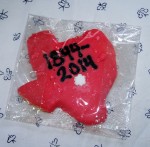
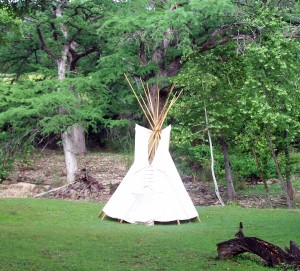
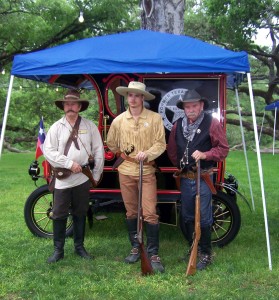
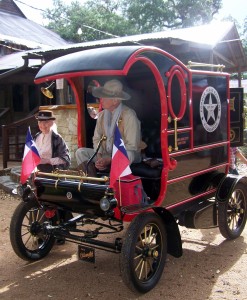
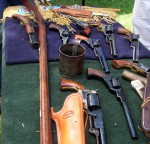
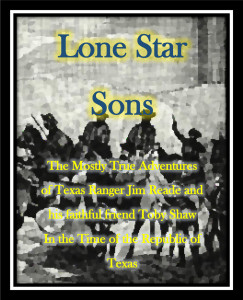
Recent Comments